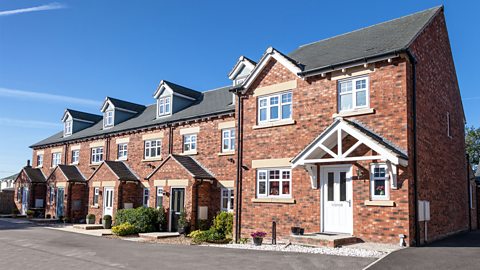Talking about where you live in Spanish.
It’s great to be able to tell people about where you live.
Vivo en una casa - I live in a house.
Mi casa es moderna - my house is modern.
Casa is feminine so you need a feminine adjective.
If you’re describing a place, you normally use es.
Mi ciudad es grande - my city is big.
If you want to say where something is located, you usually use ±≤ı≥Ÿ√°.
Mi ciudad ±≤ı≥Ÿ√° cerca de la costa - my city is near the coast.
The word cerca means ‘near’.
Mi casa ±≤ı≥Ÿ√° cerca de mi colegio - my house is near my school.
And lejos means ‘far’.
Mi casa ±≤ı≥Ÿ√° lejos de las tiendas - my house is far from the shops.
So, try to remember you normally use es for describing, and ±≤ı≥Ÿ√° for location!
Where you live
To ask where someone lives, ask ¿Dónde vives? - Where do you live?
For example:
¿Dónde vives? - Where do you live?
Vivo en un piso - I live in a flat.
Vivo en una casa en un pueblo - I live in a house in a village.

Image caption, Vivo en una casa - I live in a house
1 of 5
Look at the language in the table. Can you describe where you live?
| Spanish | English |
|---|---|
| Vivo en… | I live in… |
| una casa | a house |
| un piso | a flat |
| una ciudad | a city |
| una ciudad pequeña | a town |
| un pueblo | a village |
Describing where you live
There are two verbs for 'to be' in Spanish, ser and estar that you can use to talk about where you live.
Ser is used to give descriptions and estar is used for location.
For example:
Ser
- Mi pueblo es grande - My town is big.
Estar
- Mi pueblo ±≤ı≥Ÿ√° lejos de ≤—√°≤‘≥¶≥Û±≤ı≥Ÿ±∞˘ - My town is far from Manchester.
Describing location
You can give more details about where you live by using ±≤ı≥Ÿ√° (is).
For example:
Vivo en una ciudad peque√±a. ∑°≤ı≥Ÿ√° en la costa y ±≤ı≥Ÿ√° cerca de Aberdeen - I live in a town. It is on the coast and is near to Aberdeen.
Vivo en un pueblo en la monta√±a. ∑°≤ı≥Ÿ√° lejos de la capital - I live in a village in the mountains. It is far from the capital.
Use the table below to give more detail about where you live.
| Spanish | English |
|---|---|
| ±≤ı≥Ÿ√° | it is |
| cerca de | near to |
| lejos de | far from |
| en la costa | on the coast |
| en la montaña | in the mountains |
| en el campo | in the countryside |
| en el centro | in the centre |
| en el norte/sur/este/oeste | in the north/south/east/west |
Describing where you live
In order to give more details about what your house or town is like, you can use es (‘is’, from the verb ser) followed by an adjective.

Adjectives are words used to describe people, places or things.
Remember to make the adjective agree with whatever you are describing.
For example:
¿Cómo es tu barrio? - What is your neighbourhood like?
Vivo en un pueblo pequeñ_o_. Es antigu_o_ pero animad_o_ - I live in a small town. It is old but lively.
¿Cómo es tu aldea? - What is your village like?
Es bastante tranquil_a_ pero es aburrid_a_ - It is quite peaceful but it is boring.
¿Cómo es tu ciudad? - What is your city like?
Vivo en una ciudad turístic_a_, pero en mi opinión es suci_a_. No es muy ecológic_a_. - I live in a touristy city, but in my opinion it is dirty. It is not very eco-friendly.
Have a look at this downloadable vocabulary list to see more useful adjectives you can use to describe where you live

Comparing places
To compare two places, use ≥æ√°≤ı‚Ķq≥б and ≥æ±≤‘¥«≤ı‚Ķq≥б with different adjectives.
Remember that the adjective needs to agree with what you are describing.
For example:
Londres es ≥æ√°≤ı grande que ≤—√°≤‘≥¶≥Û±≤ı≥Ÿ±∞˘ - London is bigger than Manchester.
Mi ciudad es menos moderna que Bilbao - My city is less modern than Bilbao.
Talking about places in your town or city
To ask someone what there is where they live, ask: ¿Qué hay en tu pueblo? - What is there in your village?
For example:
¿Qué hay en tu pueblo? - What is there in your village?
En mi pueblo hay una piscina y unas tiendas - In my village there is a pool and some shops.
En mi ciudad hay un supermercado, una mezquita y también hay una estación de tren - In my city there is a supermarket, a mosque and there is also a train station.
You can use muchos/muchas to say there are lots or many of something.
For example:
- Hay muchos parques y restaurantes - There are lots of/many parks and restaurants.
Remember that the indefinite article is not used with no hay (there is no…) .
- En mi pueblo no hay polideportivo - In my town there is no sports centre.

The indefinite article is the word for ‘a’, 'an' or ‘some’. In Spanish these are 'un', 'una', 'unos' and 'unas'.
Use the language in the table below to describe what there is and what there isn’t in your town or city.
| Spanish | English |
|---|---|
| ≥Û≤π≤‚‚Ķ | there is/are‚Ķ |
| no ≥Û≤π≤‚‚Ķ | there is no‚Ķ/there isn‚Äôt‚Ķ/there are no‚Ķ/there aren‚Äôt (any)‚Ķ |
| un supermercado | a supermarket |
| un centro comercial | a shopping centre |
| un cine | a cinema |
| un teatro | a theatre |
| un polideportivo | a sports centre |
| un parque | a park |
| un estadio | a stadium |
| un centro de reciclaje | a recycling facility |
| una iglesia | a church |
| una mezquita | a mosque |
| una escuela/un colegio | a school |
| un instituto | a secondary school |
| una piscina | a pool |
| una estación (de tren/autobús) | a (train/bus) station |
| unas/muchas tiendas | some/lots of shops |
| unos/muchos restaurantes | some/lots of restaurants |
| unos/muchos monumentos | some/lots of monuments |
Talking about what you do where you live
To discuss what you do where you live, you can ask ¿Qué haces en tu ciudad los fines de semana? - What do you do in your city at the weekends?
You can enhance your answer by using different time phrases and frequency expressions with a variety of activities.
For example:
Los fines de semana voy al cine con mis amigos - At the weekend I go to the cinema with my friends.
A veces ceno en un restaurante con mi familia - Sometimes I have dinner in a restaurant with my family.
Normalmente mi hermano va de compras - Normally my brother goes shopping.
Use the table below to say what you do where you live.
| Spanish | English |
|---|---|
| los fines de semana | at the weekend |
| los s√°bados | on Saturdays |
| normalmente | normally |
| a veces | sometimes |
| voy al cine | I go to the cinema |
| nado en la piscina | I swim in the pool |
| voy de compras | I go shopping |
| ceno en un restaurante | I have dinner in a restaurant |
| juego al f√∫tbol en el parque | I play football in the park |
| salgo con mis amigos | I go out with my friends |
| hay mucho que hacer | there is a lot to do |
Quiz
Find out how much you know about talking about where you live in Spanish with this short quiz!
More on Topics
Find out more by working through a topic